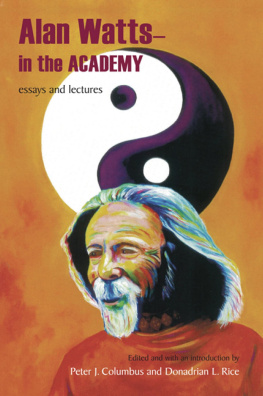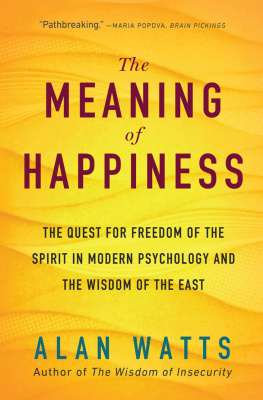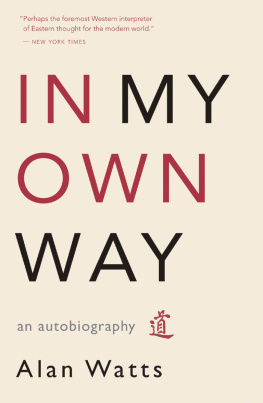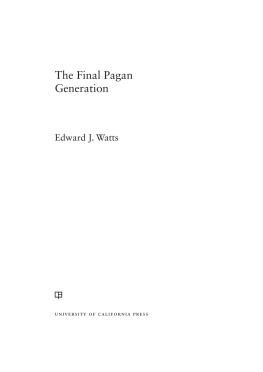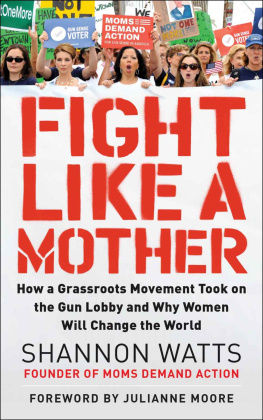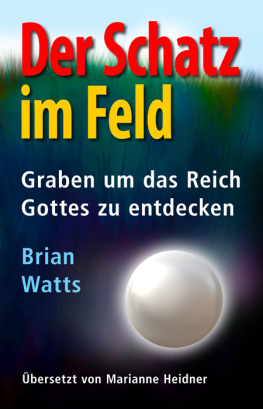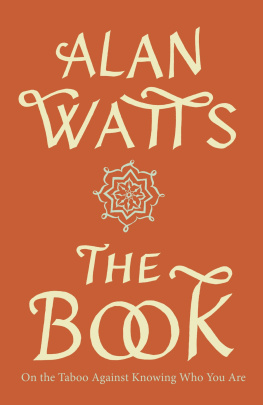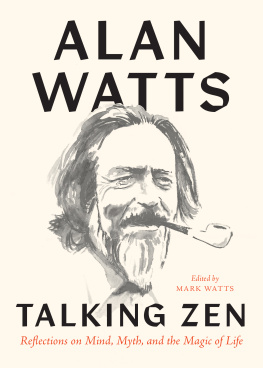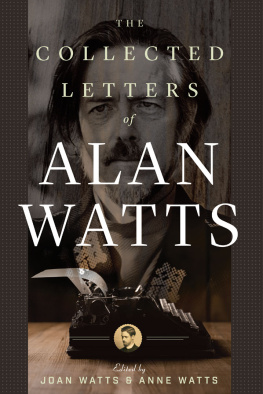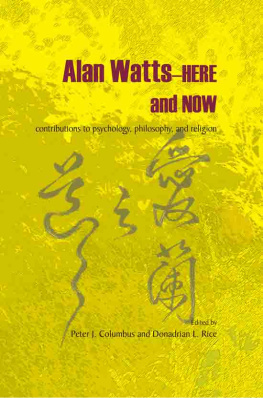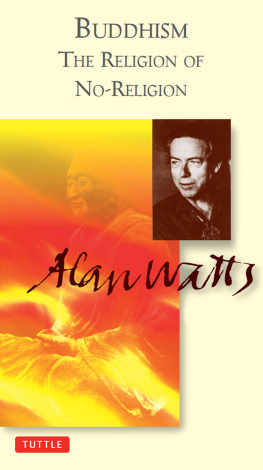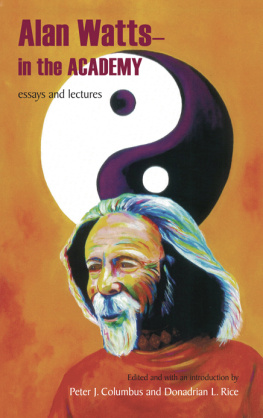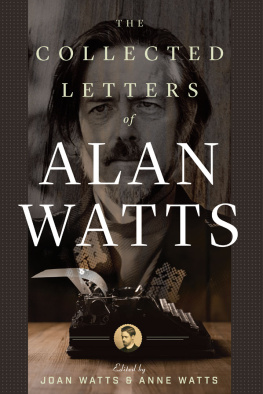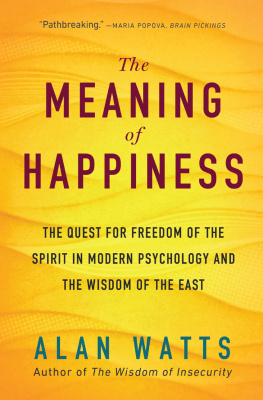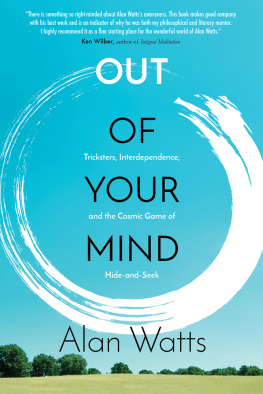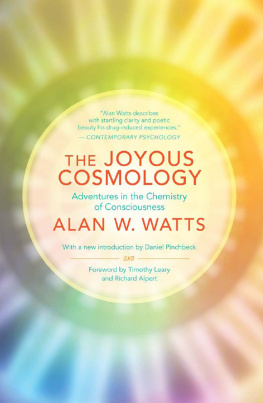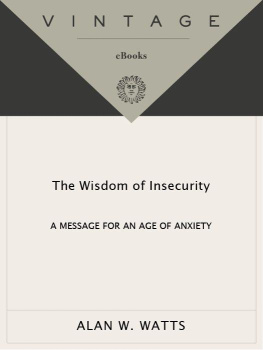Alan Watts
in the ACADEMY
SUNY SERIES IN TRANSPERSONAL AND HUMANISTIC PSYCHOLOGY
Richard D. Mann, editor
Alan Watts
in the ACADEMY
essays and lectures
Edited and with an introduction by
Peter J. Columbus and Donadrian L. Rice
On the cover : Portrait of Alan Watts by Fred RichardsDaishi, from the artists collection.
Published by
STATE UNIVERSITY OF NEW YORK PRESS
Albany
2017 State University of New York
All rights reserved
Printed in the United States of America
No part of this book may be used or reproduced in any manner whatsoever without written permission. No part of this book may be stored in a retrieval system or transmitted in any form or by any means including electronic, electrostatic, magnetic tape, mechanical, photocopying, recording, or otherwise without the prior permission in writing of the publisher.
For information, contact
State University of New York Press
www.sunypress.edu
Production, Dana Foote
Marketing, Anne M. Valentine
Library of Congress Cataloging-in-Publication Data
Names: Watts, Alan, 19151973, author. | Columbus, Peter J., editor. | Rice, Donadrian L., editor.
Title: Alan Wattsin the academy : essays and lectures / by Alan Watts ; edited and with an introduction by Peter J. Columbus and Donadrian L. Rice.
Description: Albany, NY : State University of New York Press, 2017. | Series: SUNY series in transpersonal and humanistic psychology | Includes bibliographical references and index.
Identifiers: LCCN 2016031500 (print) | LCCN 2017008164 (ebook) | ISBN 9781438465555 (hardcover : alk. paper) | ISBN 9781438465562 (ebook)
Subjects: LCSH: Philosophy.
Classification: LCC B945 .W321 2017 (print) | LCC B945 (ebook) | DDC 191dc23
LC record available at https://lccn.loc.gov/2016031500
10 9 8 7 6 5 4 3 2 1
Contents
Peter J. Columbus and Donadrian L. Rice
(with Philip D. Ungerer)
Illustrations
Editors Preface
T he year 2015 marked the centenary of Alan Watts birth. He lived only 58 years, and once conjectured that his relevance would fade within five decades beyond his death. Yet, nearly 45 years after his 1973 passing, interest in Watts life and work is not subsiding. His books remain in vogue, and popular audiences in large numbers now view his audiovisual materials via YouTube. Moreover, contemporary scholars are currently mapping Watts historical influence, and surveying his ongoing impact in a variety of academic disciplines. It is in service to this scholarly effort that we have gathered and organized, thematically and chronologically, the present anthology of writings and lectures by Watts. All materials herein, particularly endnotes, references, and figures were formatted for consistency with the American Psychological Associations publication style. Occasionally, though rarely, editorial comments were added as endnotes for clarification of subject matter.
As this manuscript reaches publication, a substantial debt of thanks is coming due. First, to everyone who generously offered permission to reprint materials. A University of West Georgia faculty grant to Don Rice helped cover any reprint fees. Jean-Claude van Itallie and the Shantigar Foundation supported Peter Columbus writing and editing. Lisa Prolmans interlibrary loan staff at the Public Library of Greenfield, Massachusetts, helped locate, identify, and acquire materials necessary for the text. Fred Richards kindly allowed use of his artwork for the cover. Three anonymous reviewers (particularly reviewer #3) offered critical commentaries affording important revisions to an early draft of the introduction. Another anonymous reviewer subsequently offered practical suggestions for final revision. The State University of New York Press editorial, technical, and marketing staff, including the late Nancy Ellegate, Andrew Kenyon, Christopher Ahn, Jessica Kirschner, Dana Foote, and Anne Valentine, shepherded the manuscript to publication. Sincere gratitude to all.
Peter J. Columbus
Rowe, Massachusetts
Donadrian L. Rice
Carrollton, Georgia
Introduction
Alan Watts and the Academic Enterprise
Peter J. Columbus and Donadrian L. Rice
As in some economies the rich keep getting richer and the poor poorer, so in the overspecialized disciplines of modern scholarship the learned get more learned and the ignorant get more ignorantuntil the two classes can hardly talk to each other. I have dedicated my work to an attempt to bridge that gap.
Alan Watts, 1975b, p. xx
T his collection of academic essays by Alan Watts serves to commemorate the centenary of his birth on the Feast of the EpiphanyJanuary 6in 1915. Watts was born into a middle-class family at Rowan Tree Cottage, in the village of Chislehurst, located on the outskirts of London. He was raised in the Church of England, educated at elite Anglican preparatory academiesincluding Kings School in Canterbury (19281932)and studied at Seabury-Western Theological Seminary in Evanston, Illinois (19411944). Receiving the Sacrament of Holy Orders on the Feast of the Ascension, May 18, 1944, Watts served as Episcopal priest, chaplain and theologian at Northwestern University (19441950), professor of comparative philosophy at the American Academy of Asian Studies in San Francisco (19511957), and freelance philosopher (19581973), including visiting scholar at Harvard University (19621964). He held a Master of Sacred Theology degree from Seabury-Western Seminary (1948), an Honorary Doctorate of Divinity from the University of Vermont (1958), and was a Fellow of the Society for Arts, Religion, and Contemporary Culture.
Watts integrated his Anglo-Catholic religious formation with knowledge of Buddhism, Daoism, and Hinduism toward resolving problems of ontological estrangement in the twentieth-century West (Morgan, 2008). His 1947 book, Behold the Spirit: A Study in the Necessity of Mystical Religion , was hailed by Fr. Alan Griffith Whittemore (18901960), superior of the Order of the Holy Cross and abbot of Holy Cross Monastery in West Park, New York, as one of the most penetrating works that ever has come from the pen of an Anglican author (as cited in Sadler, 1985, p. 2). In the 1950s, Watts vital counterpoints to capricious interpretations of Buddhist doctrine rendered him the most influential figure to come out of the era of Beat Zen (Coleman, 2001, p. 63). He subsequently offered innovative understandings of spiritual and religious consciousness amid the countercultural upheavals of the psychedelic 1960s (Roszak, 1969/1995), and was a formative influence within the human potential movementthe diverse association of psychotherapists and alternative education centers exploring groundbreaking approaches to psychological growth, personal insight, and creative expression in the 1960s and 1970s (Kripal, 2007). The death of Alan Watts, likely due to a combination of heart disease and work fatigue, occurred during his sleep on November 16 in 1973. It was the eve of the Feast of Saint Hugh, the patron saint of Watts first Anglican boarding school.
Note that two book-length biographies on Watts are available. Both are informative, if sometimes unreliable. The first, by Stuart (1976/1983), emphasizes Watts professional life but projects a rather cynical subtext (see Sadlers 1976 review). The second, by Furlong (1986/2001), places greater emphasis on Watts personal life by capitalizing partly on salacious (but dubious) accounts of Watts first marriage and his reputation for alcoholic excess. Perhaps the fairest biographical considerations of Watts are brief essays by Gidlow (1972), Sadler (1974a, 1974b) and, most recently, Chadwick (2015). See also Watts (1973a) autobiography and, for a narrative account of Watts curriculum vitae, see Columbus and Rice (2012b, pp. 23).

